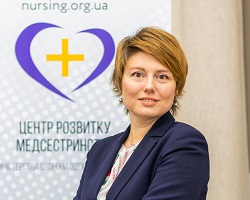Kateryna Balabanova advocates for the rights of nurses in Ukraine

Kateryna Balabanova
In 2019, the Ministry of Health of Ukraine created the Centre for Nursing Development, responsible for improving the rights of nurses and midwives in the country’s health-care system. WHO has supported the Centre from its very start with training and education materials.
“Even though nurses represent the largest health workforce in Ukraine, their voice is not always heard in decision-making processes on patient care and treatment,” says Kateryna Balabanova, Director of the Centre for Nursing Development.
“In 2014, I had to flee my home city, Luhansk, to escape the military conflict in eastern Ukraine. The conflict turned my life upside down. I lost my house, my job as a urological doctor at Luhansk hospital, and – the most painful aspect – most of my friends and social ties.
“I had to start my life from scratch in Kyiv, and I realized I could not just keep doing what I used to. I wanted to be involved in global processes, something that no local circumstance would be able to take away from me. After taking on the position of adviser to the Minister of Health, to improve the standing of the nursing and midwifery professions, I initiated the creation and became the lead of a new agency – the Centre for Nursing Development.”
Fighting at the COVID-19 frontline
“To aid health-care workers, our Centre and the analytical platform VoxUkraine, have recently developed an educational video about how to effectively use masks, gloves and protective gowns. Many infections occur when health workers don’t know how to correctly put on their personal protective equipment.
“During the current COVID-19 pandemic, nurses stand and fight at the frontline, running a high risk of being infected. The nurses carry out procedures and direct patient care, which is challenging to do from a distance. More than 20 health workers have been infected with COVID-19 in Ukraine – most are nurses.”
Nursing as a highly technical and diverse profession
“I come from a long line of health-care workers. My parents and grandparents were doctors, and my great grandmother worked first as a midwife and then as chief nurse in Luhansk Province. When I was a child, I thought that everyone studied medicine and worked at hospitals, and never considered a different profession for myself either. From my great grandmother, who raised me, I acquired the penchant for cleanliness, strict adherence to hygiene and the awareness of how important nurses are.
“I have witnessed first-hand how diverse the nursing profession is. I started my career working as a junior nurse at the traumatology unit of a Luhansk hospital. Here, I mostly assisted with bandaging but quickly realized that other more experienced nurses had many skills and competencies they put to use in traumatology care. Later, when I worked as a urological doctor, I saw nurses carry out many highly technical and complicated tasks.
“I believe we need to further develop nursing education and inspire a new generation to engage in this profession. It is not well-known for example, that nurses can develop their skills at university and master’s level as well, which offers a variety of possibilities for professional and personal growth. I am currently studying public administration at the Kyiv School of Economics. Management skills will help me make a difference in nursing.”



